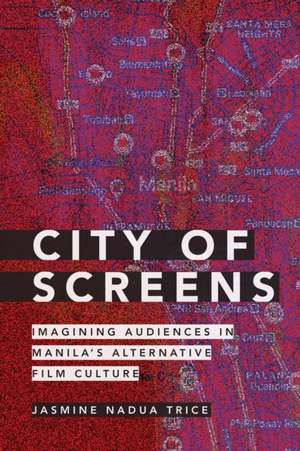City of Screens – Imagining Audiences in Manila`s Alternative Film Culture
Autor Jasmine Nadua Triceen Limba Engleză Paperback – 18 mar 2021
| Toate formatele și edițiile | Preț | Express |
|---|---|---|
| Paperback (1) | 221.61 lei 6-8 săpt. | +21.21 lei 5-11 zile |
| MD – Duke University Press – 18 mar 2021 | 221.61 lei 6-8 săpt. | +21.21 lei 5-11 zile |
| Hardback (1) | 638.10 lei 6-8 săpt. | |
| MD – Duke University Press – 18 mar 2021 | 638.10 lei 6-8 săpt. |
Preț: 221.61 lei
Nou
Puncte Express: 332
Preț estimativ în valută:
42.41€ • 44.11$ • 35.01£
42.41€ • 44.11$ • 35.01£
Carte tipărită la comandă
Livrare economică 14-28 aprilie
Livrare express 08-14 martie pentru 31.20 lei
Preluare comenzi: 021 569.72.76
Specificații
ISBN-13: 9781478011699
ISBN-10: 1478011696
Pagini: 328
Ilustrații: 21 illustrations
Dimensiuni: 152 x 229 x 21 mm
Greutate: 0.44 kg
Editura: MD – Duke University Press
ISBN-10: 1478011696
Pagini: 328
Ilustrații: 21 illustrations
Dimensiuni: 152 x 229 x 21 mm
Greutate: 0.44 kg
Editura: MD – Duke University Press
Notă biografică
Cuprins
Acknowledgments ix
Introduction 1
1. Revanchist Cinemas and Bad Audiences, Multiplex Fiestas and Ideal Publics 39
2. The Quiapo Cinematheque and Urban-Cinematic Authenticity 79
3. Alternative Exhibition and the Rhythms of the City 113
4. "Not for Public Exhibition": Cinema Regulation, Alternative Cinema, and a Rational Body Politic 153
5. "Hollywood Is Not Us": National Circulation and the Speculative State 189
Epilogue 230
Notes 241
Bibliography 281
Index 299
Introduction 1
1. Revanchist Cinemas and Bad Audiences, Multiplex Fiestas and Ideal Publics 39
2. The Quiapo Cinematheque and Urban-Cinematic Authenticity 79
3. Alternative Exhibition and the Rhythms of the City 113
4. "Not for Public Exhibition": Cinema Regulation, Alternative Cinema, and a Rational Body Politic 153
5. "Hollywood Is Not Us": National Circulation and the Speculative State 189
Epilogue 230
Notes 241
Bibliography 281
Index 299
Descriere
Jasmine Nadua Trice examines the politics of cinema circulation in early-2000s Manila, showing how the rising independent Philippine cinema movement has been a site of contestation between filmmakers and the state, each constructing different notions of a prospective, national public film audience.
